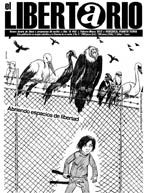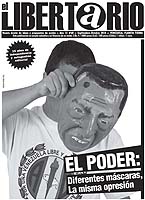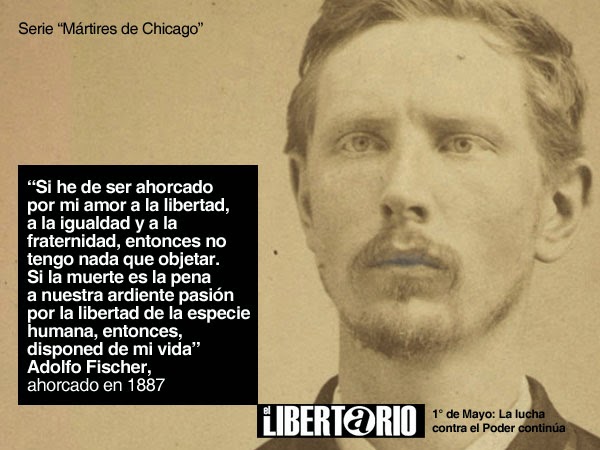Ballast Magazine (http://www.revue-ballast.fr/)
1. You published a book about the history of anarchism in Venezuela. Let’s discuss the 20th century in particular. What role did the anarchist movement develop during the period of the Punto Fijo Pact and the “Caracazo” of 1989?
The presence of anarchist groups during the democratic period prior to
the Chavist reign can be divided in two parts: one that goes from 1958 to 1970,
where the Spanish exiled presence is a notable characteristic until the
dismantling of the experience in the Central University of Venezuela, and
another part which began from that event and lasted until the early decade of
1990.
Before that, a connection existed between some militants from Accion
Democratica and Spanish exiles of the CNT. Bernardo Perez Salinas, Jose
Gonzalez Navarro, Augusto Malave Villalba, Salom Mesa Espinoza and Francisco
Olivo were some “adeco” figures that helped many exiled Spanish Anarcho-syndicalists
during 1945 by facilitating their entrance into the country and helping them
obtain employment, along with supporting them financially. As opposed to PCV,
URD or COPEI, during their beginnings AD was an incredibly agrarian and
anti-imperialist party that had access to logistic support from Spanish
refugees.
With the emergence of factors like the decay of the previous
social-democracy, the defeat of the armed forces that pushed for a left-wing
Marxist regime in the decade of the 1960s and the continual institutional
deterioration, there was a modest resurgence and apparition of anarchist groups
that rejected the social-democratic status quo (during the end of the 70s and
80s).
The “Caracazo” (27/2/1989) was a populist event that had certain
anarchist traits (looting, attack on private property and houses of political
leaders, confrontations with the army), but it was not orchestrated by
anarchists because they didn’t have any relevant leadership or organization. We
can find similarities of this social explosion with the subsistence riots
through the fifteenth and nineteenth century in Europe.
What does need to be rescued from our anarchist history is that the
Caracazo affair kick-started a resurgence of anarchist presences in different
unions, neighbourhoods and amongst the peasant community through organized
events, such as the strike of HRH. Other ways in which these anarchists fuelled
their revival in Venezuela was through their presence in the neighbourhood
assemblies, mobilizations against the economic system, protests against the
celebration of the fifth centenary of the discovery of the Americas and the
solidarity with the peasants in the area of Los Cañizos-Palo Quemado (in the
state of Yaracuy).
If you happened to be more interested in this particular anarchist
timeline I would recommend to you the book Contracorriente:
La historia del movimiento anarquista (1811-1998), which will be released
this year through La Malatesta Editores in Madrid. The anarchist presence
during this aforementioned period is exposed chronologically and is very well
documented.
2. what relationship did you have with the first attempted coup d’État of chavez in 1992 (support or condemnation)? And with the movement of the fifth republic? were any compromises drawn with “chavismo” before the arrival of power in 1998?
El Libertario didn’t exist – as a publication or collective –during
1992. It started publication in 1995. However, a clear and well-reasoned
opinion of the rejection of the military coup of 1992 was expressed in Correo A,
an anarchist column published in Caracas (see http://correoa.blogspot.com). Other
than that, any association with the military group that planned the coup was
avoided because it was inspired by completely different ideals towards the
intended form of social liberalism.
The Movimiento V República (MVR) was founded after Chávez’s prison
departure in 1997. Due to the movement’s vile characteristics (pro-militarism,
affinity with more authoritarian expressions, opportunism and alliances with transnationals,
shameful subversive speeches centred on prejudice), we looked for no
relationship whatsoever with such group. In fact, that party generated fear
among us in regards to what their eventual ascent to power would mean for
Venezuela. This daunting prospect was unfortunately proven to be true during
the start of Chávez’s first presidency reign in 1999. In our website www.nodo50.org/ellibertario you
can consult the editions of El Libertario that covered those years more
in-depth.
Additionally, a part of our collective in El Libertario presents a
testimony that amplifies and highlights this answer towards Chávez:
«In my own case I was one of the hundred founders of the movement Quinta
República, as evidenced by all the constitutional documents from that political
organization. I was a witness to the foundation of that party and I perceived
clearly that it was based on a militarist and Stalinist organization. The
leader Hugo Chávez decides everything about the party, such as the financers of
his electoral campaign.
It was a heterogeneous movement because frustrated left-wing members
coming from a previous military, political and social defeat were
participating. After the frustration of the armed conflict Chávez gave the
left-wing an opportunity of a quota of power and that was very attractive for
those in several Marxist groups: the Communist Party, The Socialist League,
sectors of the Red Flag and Tercer Camino-Ruptura, the MAS, the MEP and all
kinds of left-wing political spectres. Similarly, there were also neo-fascist
militants that had participated in the repression of the 27th of
February of 1987 with their own reactionary formation of administrators of
violence of the state in Venezuela.
Chávez was so militaristic that his option of the coup d’état had no
presence in the means of communication of the masses or in the civil
participation of its planning, as the plan was only organized by the officials
of the Armed Forces. Therefore, a military lodge wanted to take power in
Venezuela without requiring society. »
3. You are very critical in regards to the “boliviaran
revolution”. why don’t they deserve that name? what balance do you believe is
there to be made from “transition until socialism” through the state’s power?
Firstly, the own adjective of “bolivariano” only serves to cover up,
with fascist terminology, the invocation of the liberator Simón Bolívar in
order to give him certain military legitimacy and identity, associating it with
processes like the secession of the fallen Spanish empire at the start of the
19th century.
There was no such thing as a “Boliviaran revolution” because in
Venezuela there has been no type of social, economic, cultural or political
transformation. It’s basically a continuation of the bourgeois democracy system
that was installed during 1958 with the military. Their politics are
essentially based on Clientelism with irrelevant reforms. Additionally, it is
an authoritarian experience with overtones of a major political presence in
national life. Never before, not even in the military administrations of Juan
Vicente Gómez and Pérez Jiménez, had such a wide space of society been occupied
by the state apparatus. With Chávez the armed forces were allowed to control
finances, food, construction, military purchases, and even criminal businesses
centred around the contraband of gasoline and drugs.
As there was no revolution there was simply no transition towards
socialism. It’s a fictional narrative used to sweeten the Venezuelan scheme
based around Fidel Castro. Not even the economy is socialist because only 3% of
the Gross domestic product belongs to the social sector. Similarly, not even on
the political side have steps been made to create a democracy based on
participation but the exact opposite, as every time there is a bigger
concentration of power in the hands of the armed forces and the deceased
leader. No power of the state is socialist because it is an apparatus aiming
for domination of society.
So much more must be expressed in a critical tone towards the so-called
“bolivariana revolution”. This isn’t possible for all of the interview, so we
recommend the excellent book of Rafael Uzcátegui, colleague of El Libertario, Venezuela, la revolución como espectáculo, edited in Spanish,
English and French, which is accessible on the internet.
4. You point out that one of the biggest red flags is
the absence of environmental policies. what solutions do you suggest to get rid
of the petroleum business that nowadays finances important social programs of
health and education?
One of the many red flags are precisely the decisions made towards the
environment. Multiple violations exist against the environment, as demonstrated
by the extraction of coal in the state of Zulia, which is then given to
transnationals. Other multiple examples include the platform where gas is
extracted, the building of electric cables towards Brazil where no attention
was paid to the environment and the constant use of fracking confessed by the
monopoly of petroleum. Even the construction of infrastructure is a serious
ecological matter because it has no respect for urbanist regulations in the
denominated Gran Misión Vivienda Venezuela, which is an entirely improvised
program where they have built infrastructure in areas of high seismic risk such
as Ciudad Caribia next to the freeway of Caracas-La Guaira.
Venezuela can’t continue being an extractivist economy because that
paradigm is responsible for the current critical juncture. Several well-known
figures like economist Alberto Adriani, intellectual Arturo Uslar Pietri,
founder of the OPEP Juan Pablo Pérez Alfonso and professor and prolific writer
Domingo Alberto Rangel all predicted this. However despite this voiced
opposition the administrations of Juan Vicente Gomez (gomecismo), Pérez Jiménez (perezjimenismo)
and the representative democracy were never interested in the outcome. There
was never any intention to rectify the oil industry, simply because that is the
role assigned by global factors of power in Venezuela, such as being providers
of fossil energy, which was abided with obedient enthusiasm by the local
political élite.
Contrary to popular belief, the oil industry doesn’t finance social
programs, instead it finances health programs, which operate on a much smaller
and effective scale that try to make us believe the official propaganda.
Missions are mere populist mechanisms to obtain an immediate solution to
long-term problems because they don’t attack our hierarchal roots: poverty and
lack of social security, which have not been solved by Chavismo or Maduro’s
government.
5. Nicolás Maduro criticizes the economic situation by
blaming it on factors like the united states: the lack of food, the voluntary
depreciation of Bolívar and treacherous media campaigns would supposedly form
part of the classic strategy of south-american liberals: do you believe this
explanation? Would a common ground against the reaction be possible?
It’s a shame that the question is presented in such a tone which seems
to assume, or at least give credibility, to the “anti-imperialist” language
used by Maduro’s government to excuse the horrendous failure of his economic
management, which is a mere continuation of the path drawn by Chávez. Seeing an
American conspiracy based on imperialism as a main cause for the critical
situation we are living nowadays in Venezuela makes people ignore – and even cover-up-
the true people responsible for this situation.
There is simply no such thing as an economic conspiracy against
Venezuela perpetuated by the Pentagon, the CIA or Wall Street. The erratic path
taken by Chavez’s management and Maduro is solely responsible for the economic
and political decay that has occurred here. The lack of food, shortages and
hyperinflation (highest in the world) are all a consequence of a truly
incapable government. Chávez proposed closing the industrial and agrarian
sector to accentuate people’s dependence to the state, and to substitute the absence
of national production he employed petrodollars in a massive process of
importations. But what ended up happening through this reckless policy was that
the price of the oil barrel fell and now there is nothing else to import. This
is ironic considering that Venezuela was a country that no long ago exported
coffee and other agrarian products like grains.
The national currency has suffered a process of devaluation and such
circumstances have generated an inflation of more than 200% in 2015 alone. The
real value of the American dollar is somewhere between 200,000 Bs. Foreign
exchange doesn’t even exist and an aggressive speculation has been created
towards the American currency.
We are also unable to talk about media campaigns because Maduro controls
the majority of the press, radio and television. The state doesn’t have many
resources but they have somehow figured out how to purchase several forms of
communication through bourgeois business groups closely linked to the
government, thus closing some in the process like Radio Caracas Televisión. All
written resources have also been bought, such as the newspaper Últimas Noticias and very popular papers
like Universal, whose clients are
mainly middle and upper class citizens. Through illegal methods they have
achieved complicity and communicational silence. Other than that, disqualifying
all corruption accusations that operate on different levels in our government
(such as drug trafficking) with the predictable excuse of “American imperialist
campaigns” allows the government to enjoy virtually no voiced criticisms.
6. Do you participate in popular
neighbourhood’s communes? are there any negative opinions towards them? is it
an instrument used so that the population becomes a “political subject” for the
local democracy?
Again, this is another question made from a perspective
which has certain ingrained propaganda overtones, which are only believable for
those unaware of how the reality of life is in neighbourhoods, agrarian
communities or Venezuelan indigenous communities. Communes are
semi-governmental entities controlled and financed by the executive national
power, which is clear and explicitly regulated. The communes have no autonomy
and they complete the function of administrating political clients of military
regimes.
7. Chavism uses a patriotic
narrative of the population by taking advantage of the political history of the
country (Bolívar, Miranda, Zamora, etc.). what opposing narrative do venezuelan
anarchists and libertarian movements use?
Chavism has mixed Juan Vicente González and
Eduardo Blanco’s historical period with the Marxist-Stalinist, whose most
well-known historians are Carlos Irazábal, Federico Brito Figueroa, J.B. Fuenmayor
y J.R. Núñez Tenorio. It’s a unification of the foundations based around the
militarisation of the nation and the “Discovery of America”, with revolutionary
figures like Simón Bolívar. This oligarchy élite was highly racist and
subjugated the Spanish into their social hierarchy. It’s their strategy to
re-write national history to justify and obtain certain legitimacy.
The Venezuelan population has been formed by
authoritarian symbols and its history has been taught form a reactionary
perspective that has proposed to create and impose patriotism within the
population. The narrative that we, as anarchists, steer towards is more towards
a path of liberation, of freeing ourselves from our tragic past and even worse
present. This can only be achieved with a high degree of social consciousness
that exposes the fact that conservative symbols have sponsored left and
right-wing authoritarianism.
8. The last electoral
results in argentina and venezuela indicate a turn towards the right-wing of the
continent. how do you predict the future and reconfiguration of the forces from
the left in south-america?
Another question which requires clarification, as, for instance, suggesting that in Argentina Scioli represented the “left-wing” and that, due to his defeat, there has been a “turn to the right-wing” is surprising and even grotesque. Equally, if we look closely towards essential economic and social processes, further from the superficial distinction that separated the regimes of the right from those of the left.
The state’s power in South-America has
remained the same, regardless of left populist or right-wing regimes. In the
decade of the 60s it was the military regimes of the Cold War, in the 70s
social-democratic populism emerged, during the 80s it was neoliberalism, in the
90s the left-wing and now the centre right-wing. They are all variants of the
same administration of power of the region. Who can still possibly believe in
the historical renovation of events like corruption in Brazil through the
leadership of Lula Da Silva y Dilma Russef, or the immense appropriation
structure of the oil industry by the Venezuelan military? They are the same
thing, the only difference is the language they use to justify their actions.
The left-wing of the future must look for the
destruction of power instead of managing it because its role has been evident
from the beginning. This modification will through an ideological redefinition
and a reformulation of objectives for the future of Venezuela.
31/January 2016
[Note:
The French version of the interview will be published in the magazine BALLAST,
which will be printed out during the 1rst term of 2016. The Spanish version is
available in http://periodicoellibertario.blogspot.com/2016/01/entrevista-desde-francia-al-colectivo.html.]



















































No hay comentarios:
Publicar un comentario
Nos interesa el debate, la confrontación de ideas y el disenso. Pero si tu comentario es sólo para descalificaciones sin argumentos, o mentiras falaces, no será publicado. Hay muchos sitios del gobierno venezolano donde gustosa y rápidamente publican ese tipo de comunicaciones.